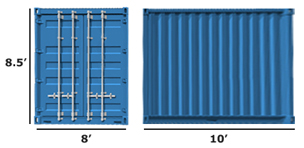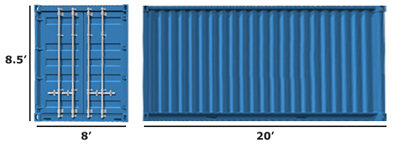
Cost Effective Container Rental
Renting or leasing is a great cost effective way of gaining access to a portable storage container without spending thousands of dollars up front. The cost of renting a container to be used for a short period of time is much more economical than purchasing your storage or shipping container.
Some of the Many Uses of Commercial Site Containers:
- Jobsite Supply Storage
- Farm and Ranch Equipment Storage
- Feed Storage
- Business Overflow Storage
- Long Term Records and Files Storage
- Training Facility
- Military and Fire Training
- Vehicle Storage: ATV, Snowmobile, Sea-Doo, Antique Car, etc.
- Restoration Parts Storage
- Tool Shed
- Workshop
- Retail Inventory Overflow
- Seasonal Inventory Holding
- Remodeling Temporary Storage
- Restaurant Refrigerated Storage
- Temperature Controlled Food Storage
- Studio Space
- Sports Equipment Storage
- Emergency Shelter
- Roadside Stand Structure
Get a Free Quote Now
Commercial Container Sizes
10 Ft. Storage Containers
Typical Uses: indoor warehousing, tool sheds, business onsite seasonal storage
Dimensions: 10' long x 8' wide x 8 1/2' high
How much will it hold: Contents of a large bedroom
Available As: Standard Dry

20 Ft. Storage Containers
Typical Uses: job sites, retail stores, excess inventory
Dimensions: 20' long x 8' wide x 8 1/2' high
How much will it hold: about the contents of a 2 car garage
Available As: Standard Dry / Refrigerated

40 Ft. Storage Containers
Typical Uses: shipping, construction sites, equipment storage, sports equipment storage.
Dimensions: 40' long x 8' wide x 8 1/2' high
How much will it hold: about contents of a large 4 bedroom house
Available As: Standard Dry / Refrigerated

40 Ft. High Cube Storage Container
Dimensions: 40' long x 8' wide x 9 1/2' high
Available as: Standard Dry / Refrigerated
While standard containers average about 8.5 feet tall while the high cube containers are 9.5 feet high with a much larger total storage capacity.

Standard Features of our Commercial Site Container
Storage containers are constructed with 12- or 14-gauge corrugated steel sides. Container frames are made of minimal 6-8-gauge steel. Containers have approximately 1" hard wood floors that are treated. Standard containers come equipped with a cargo door. Cargo doors are excellent because they seal tight from rodents and the elements. They also give you the ability to open the entire end of the container and load very large items. Roll up doors are convenient because they are light weight and easy to open. This confidence comes with obvious downsides. Roll up doors are not as secure and are not 100% water tight. As a typical garage door water tends to seap below the door. They are typically also not rodent proof. Ask the Container Alliance partner in your area about door options and specifications.
Commercial Container’s Additional Features:
Our Commercial Site Containers offer many other optional features such as:
Shelves and Racks, Air Vents, Refrigeration, Roll Up Doors, Swinging Doors, Multiple Doors, Container/Office Combo Units, Ramps
Meets all International Standards Organization Specifications
Our shipping containers comply with typical ISO specifications allowing your unit to meet height, width and length standards. This important feature guarantees that all equipment handlers, rail cards, slot spaces on vessels will be able to accommodate your unit
Ocean Freight Shipping
ISO (International Standards Organization) shipping containers are designed for ocean freight shipping. Our ocean freight containers are engineered to withstand heavy loads and vigorous marine environment. This makes them the perfect strong storage option. Shipping containers are excellent for storage purpose. They have been over engineered for ocean freight shipping and can withstand any conditions thrown at them.
Solid Heavy Duty Construction
Commercial Storage Containers are constructed with 12 or 14 gauge corrugated steel sides. Container frames are made of 6 or 8 gauge steel. Containers also have approximately 1" hard wood pressure treated floors. Each container comes equipped with a cargo door covering the entire end of the container. Cargo doors provide an excellent tight seal, to protect your items from rodents and the elements. They also give you the ability to load large items. Additionally we offer several alternative door configurations. Roll up doors are convenient, light weight and easy to open. Roll up doors also have a few disadvantages. Roll up doors are not as secure and are not 100% water tight. Just like a typical garage door, water tends to seep below the door. They are also typically not rodent proof.
What do I need to know to consider before renting a Commercial Container?
Foundation
Containers are designed to be supported at each of the 4 corners. Be prepared to support the ends with a concrete footing, railroad ties, asphalt or a bed of gravel. It is not advised to place the container directly on the ground with no support. The best option is one that provides suitable stability to keep the container level with adequate drainage. Furthermore, an uneven site can cause the doors to bind.
Space Requirements
The delivery of a storage container is normally done with a semi tractor-trailer. The trailer that carries the container tilts so the container slides off the bed of the trailer. Because the container slides off the back of the trailer, you will need more than 80 feet of space in front of the location where the container is to be landed. Plan to leave around 40 feet of turn space for the loading and unloading equipment.
Delivery
Your preferred vendor will deliver the container most likely with a tilt bed roll of style truck or trailer. Smaller units will often arrive on a medium sized flat-bed tow truck and require up to 60 feet to backup. Larger units will arrive on a tractor trailer and may require up to 80 feet of space.
